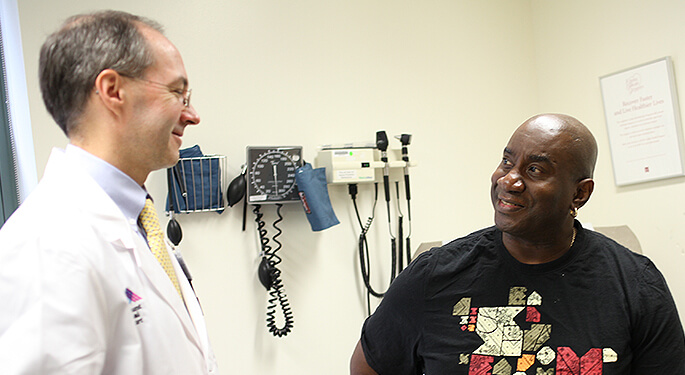Hypertrophic Cardiomyopathy

A complex disease marked by a thickening of the heart muscle, hypertrophic cardiomyopathy (HCM) makes it difficult for the heart to pump blood. It forces the heart to work harder to get blood circulating throughout your body. HCM also causes disruptions in heart rhythm, which can sometimes be fatal. The condition is usually passed down through families, and is believed to be a result of several defects in genes that control the growth of the heart.
At Mount Sinai Fuster Heart Hospital, we take a multidisciplinary team approach to evaluating and treating hypertrophic cardiomyopathy. Our physicians continue to make important discoveries about the mechanisms of the disease, offering comprehensive diagnostic evaluations, a wide range of treatments, and screenings for family members who might be at risk.
Symptoms
HCM doesn’t affect everyone the same way. Some people experience shortness of breath, difficulty exercising, chest pressure or fainting. Some even have no symptoms at all. Most young athletes and people under age 30 who die suddenly of a heart condition have hypertrophic cardiomyopathy.
If you experience fatigue or shortness of breath that affects your daily life and is caused by heart disease, you should be checked by a cardiologist.
Diagnosis
Mount Sinai Fuster Heart Hospital, our cardiologists use echocardiography or sound wave imaging to photograph the heart and determine how thick its walls are. Normally, heart walls measure 11mm or less, but heart walls in patients with hypertrophic cardiomyopathy can range from 14 to 60mm in thickness.
There are two types of hypertrophic cardiomyopathy. Patients with obstructive HCM usually have trouble with their mitral valve, one of the valves that keeps your blood flowing in the right direction. If you have obstructive HCM, your mitral valve might block blood from leaving the heart. This makes the heart work especially hard.
If you have unobstructive hypertrophic cardiomyopathy, your ventricle walls thicken but it doesn’t affect your blood flow. Rather, the chambers can’t relax enough to fill with blood, making the pumping action inefficient. If you have this condition, you might experience shortness of breath, chest pain, and blackouts. But you are unlikely to develop severe complications. Most patients with unobstructive HCM require routine monitoring and medical therapy.
Treatment
Treatment for patients with symptomatic HCM generally begins with medication. If medication doesn’t work, your physician will discuss options including implanting a pacemaker or implantable cardioverter defibrillators (ICDs) or surgery with you. ICDs shock your heart back to a normal rhythm if a life-threatening irregular heartbeat occurs but are appropriate for only a small number of HCM patients.
In addition, at Mount Sinai Fuster Heart Hospital, we teach our patients how to manage the disease and make lifestyle changes to promote heart health, including nutrition and exercise.